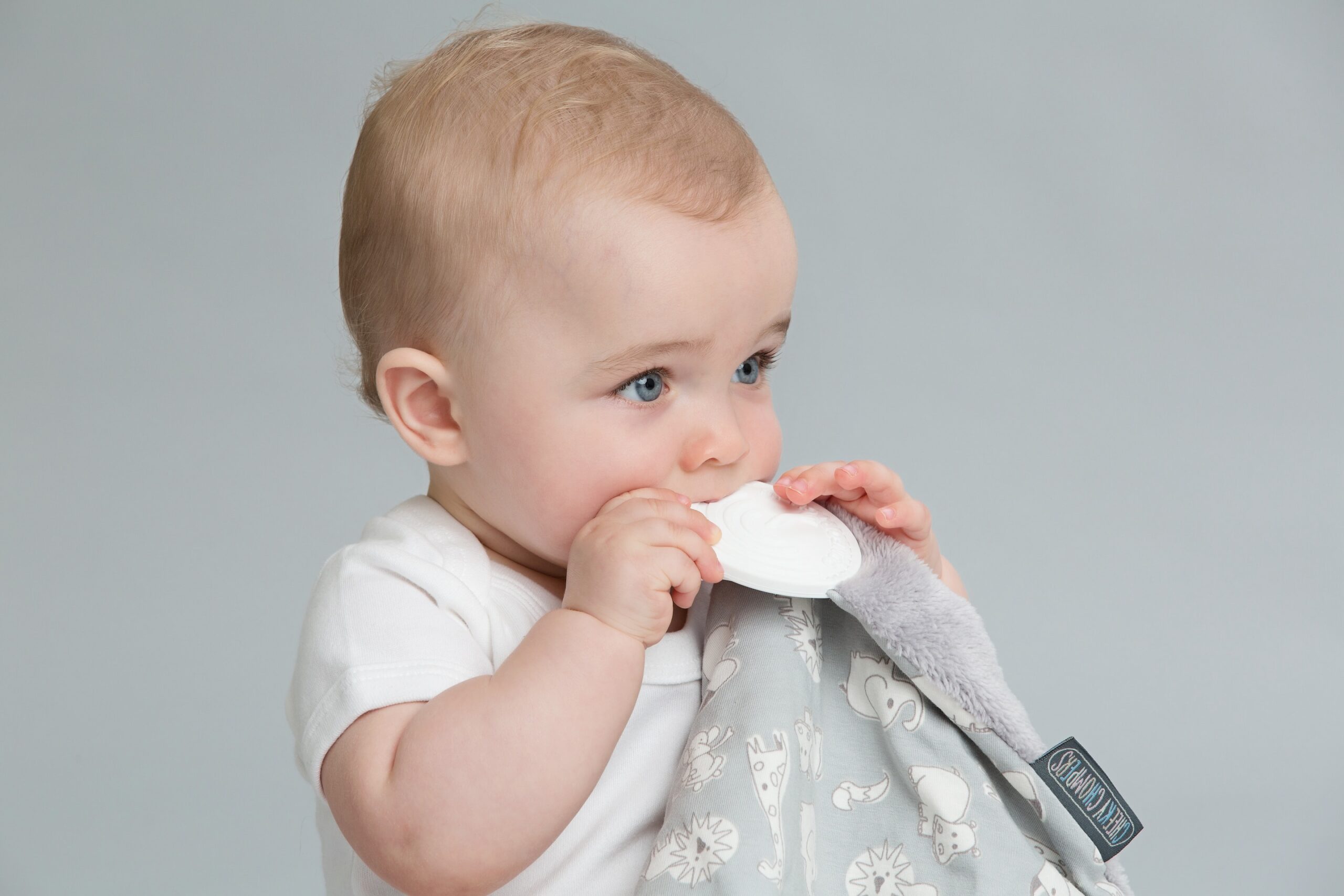Introduction
You will look for and treasure important developmental milestones, such as the appearance of your baby’s first tooth and those adorable toothy grins. There is a large amount of variance in the timing of teething from one baby to the next, which is useful information to have if you are curious about when they will make their appearance. Keep on reading to learn when your baby may start teething, the signs and symptoms of teething, and how long teething typically lasts so that you can prepare for it.
When Do Babies Start Teething
The process of a baby’s first tooth erupting into their gums typically begins between the ages of 6 and 12 months; however, there are instances in which this milestone can occur earlier or even a little bit later. There are extremely unusual instances in which infants will either be born with a tooth that has already emerged or will have a tooth emerge within the first few weeks of their lives.
Keep an eye out for symptoms of teething, such as sore gums, drooling, or gnawing on a fist or a finger, as these could be indications that a tooth is about to come through the gums.
What Should You Do If Your Child Starts Grinding Their Teeth Later Than Expected?
It is important to keep in mind that the process of developing teeth is not a race and that your baby’s teeth will come in at their own pace when the time is right. Therefore, you shouldn’t be concerned if the children of your friends get their first teeth before your baby does.
When it comes to teething, there is a wide age range that can be accommodated. Even though teething is most likely to start between 6 and 12 months of age, the first tooth can come in as early as 3 or 4 months or as late as 14 months. It all depends on the baby. There is a possibility that some infants fall just slightly outside of this range on either end. There is a possibility that timing is determined by genetics.
Naturally, if you are concerned about the teeth (or lack thereof) of your baby, or if you have any questions regarding dental care, you should speak with her healthcare provider or a dentist.
How Long Does Teething Last?
There is no set timeframe for how long the teething process will last. However, by the time your child is somewhere between the ages of two and three, he or she will have a complete set of 20 primary teeth. This indicates that the entire process of teething can take up to two years.
If your child is experiencing discomfort from teething, know that it is most likely temporary and will pass. Symptoms of teething are typically felt in the days leading up to the eruption of a tooth; once the tooth has emerged, the discomfort typically subsides until the next tooth begins to come in.
Signs and Symptoms of Teething
The process of teething is unique for every infant. Some people experience almost no symptoms, while others go through months of discomfort and irritability associated with teething.
It will be easier for you and your baby to get through this developmental stage if you are aware of the symptoms associated with teething. The following are some of the first signs that your baby is teething:
1. Drooling
Teething can cause a significant amount of drooling, which is difficult to believe given the size of the mouth of a baby who is going through this process. Drooling typically begins anywhere between 10 weeks and 4 months of age for the majority of babies, and it may continue for as long as your baby’s teeth are still erupting into their gums.
Attaching a bib to your infant will help keep him more comfortable and clean, especially if you notice that his shirts are always getting wet. To prevent his chin from becoming chapped, wipe it softly with a tissue several times throughout the day.
2. Teething Rash
Your child may experience chafing, chapping, redness, and rashes around his mouth, chin, and even his neck and chest if he or she is teething and drooling excessively. It can be removed with a pat, which will help prevent irritation.
You can also use Vaseline to create a barrier against moisture in the affected area, and then moisturize as needed with a mild skin cream that is fragrance-free. Nursing cream is wonderful for protecting the delicate skin of infants as well.
3. Coughing or Gag Reflex
Babies are more likely to gag and cough when they have their mouths constantly filled with spit. As long as your baby is showing no other symptoms of a cold, the flu, or allergies, there is no reason to be concerned about this.
4. Biting
Babies experience a great deal of discomfort as a result of the pressure caused by teeth breaking through the gums. This discomfort can be alleviated by applying counter-pressure, also known as chewing and biting.
Teething babies will gum anything that is within gnawing distance, including rattles, their hands, your nipples if you are breastfeeding (though if this happens, you should take him off the breast and offer a cold washcloth or some other form of comfort), your fingers, crib gates, and stroller guards.
5. Crying or Whining
The process of teething can be relatively painless for some infants. Others are in a great deal of pain as a result of the inflammation of tender gum tissue, and they feel compelled to share this pain with you in the form of whining or crying. Others are in a great deal of pain as a result of the inflammation of tender gum tissue.
First teeth, as well as molars due to their larger size, typically cause the most discomfort. Thankfully, most babies eventually become accustomed to the discomfort associated with teething and are less bothered by it as time goes on.
6. Irritability
As that new tooth pushes against the gums and erupts through the surface, your infant’s mouth will likely be in discomfort. It is not surprising that he will most likely experience a sense of disorientation as a result of it.
Some infants may only be fussy for a few hours, while others may continue to be agitated for days or even weeks at a time.
7. Refusing to Eat
When a fussy baby wants to calm down, putting something in their mouth, like a bottle or their mother’s breast, is the best way to do it. However, the suction created by nursing can aggravate the discomfort that an infant is experiencing in their gums as they are teething.
Because of this, teething babies can be difficult to feed, and they become even more irritable when neither their discomfort nor their stomachs find relief from the symptoms of teething. Those who are already eating solid foods may choose not to consume anything while their teeth are coming in.
8. Night Waking
Even if your infant has a history of sleeping through the night, the discomfort that accompanies the emergence of his baby teeth may cause him to wake up frequently during the night.
9. Ear Pulling and Cheek Rubbing
Babies whose teeth are erupting may play with their ears, rub their cheeks or chins, or pull furiously at their earlobes. Because the gums, ears, and cheeks share nerve pathways, an ache in the gums (especially one caused by erupting molars) can be felt in other parts of the face.
Remember that pulling on the ear is not only a sign that your baby is tired but also a symptom of an ear infection, so it is important to investigate the cause of this behavior.
10. Gum Hematoma
Have you noticed a bluish lump developing beneath your child’s gums? There is no need for alarm because it is most likely a gum hematoma, which is simply blood that has become trapped under the gums as a result of the eruption of a tooth.
The pain can be alleviated by applying a cold compress or washcloth to the gums, which may also help the hematoma heal more quickly. Visit your pediatric dentist if the hematoma continues to expand after treatment.
How Do You Soothe a Teething Baby?
These tried-and-true teething remedies have been proven effective in easing the discomfort that babies experience while cutting their first teeth:
1. Teething Toys
The gumming action provides counter-pressure, which relieves the aching as teeth push up and into the mouth. For this reason, teething babies love to chew, and for good reason.
Teething relief products, such as bumpy rubber teething toys, your clean finger, or a soft, wet toothbrush (without toothpaste) rubbed firmly on baby’s gums can provide soothing counter-pressure. Other options include teething rings, which can be uncomfortable for the baby.
Your baby may resist at first because it will hurt, but it is frequently the most effective natural remedy for teething pain and will bring relief very quickly.
2. Cold Temperatures
The discomfort associated with teething can be alleviated by using cold compresses on your baby’s inflamed and tender gums. Try:
- Refrigerated Toys
When the object you’re chewing is cold, it numbs the gums and makes chewing even more effective. Make sure there is a supply of wet washcloths or teething toys stored in the refrigerator. Teething rings and clothes intended for the baby to chew on should not be stored in the freezer.
- Cold Drinks
When babies are over six months old, which is the age at which water can be introduced, a bottle of cold water can provide chilly relief to aching gums. If your infant refuses to drink from the bottle, you can try giving him water that has been cooled but does not contain ice in a cup instead.
- Cold Food
It’s possible that snacks kept in the refrigerator, like yogurt, blended peaches, and applesauce, will look and smell more appetizing to your child once they’ve been introduced to those foods. You could also give your child pureed frozen fruits like raspberries and plums in a baby feeder mesh bag to prevent large chunks of food from posing a choking risk. However, this should only be done under the supervision of an adult and with your child seated in an upright position. Avoid giving your child cold foods to suck on throughout the day as a means of relieving discomfort. Doing so can erode the enamel on the child’s newly emerging teeth, which can result in tooth decay in the future.
3. Pain Relievers
Talk to your baby’s pediatrician if the usual teething remedies, such as chewing, rubbing, and sucking on chilled foods, aren’t doing the trick, especially if teething is keeping your baby up at night. You will likely be given the go-ahead to give your baby acetaminophen (if the baby is older than 2 months) or ibuprofen (if the baby is older than 6 months). Make sure that the dosing instructions are followed exactly.
Bear in mind that a baby who is teething is looking for extra comfort in the form of extra cuddles, kisses, and lots of patience from those who care for them.
Conclusion
The process of teething can be difficult for both you and your baby at various points. Remember how vital those teeth are to your child’s ability to chew and break down the healthy foods that are essential to his growth and development, and try not to take their presence for granted.
If you’re still waiting for your first tooth, you should know that it won’t be long before you get it and that more teeth will follow after that. That grin is going to be even cuter with each new tooth that comes in, even if it was already pretty cute.



